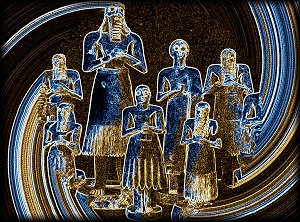Rambling ruminations follow.
Mark’s gospel opens with a series of commands of Jesus compelling demons to be quiet and not to proclaim his identity: 1:25; 1:34; 3:12.
But Jesus does not have the power to hold a healed leper to silence about him: 1:44-45.
Jesus can also compel a storm to be silent: 4:39.
He can command a man he has just liberated from possession by demons to go and preach in Decapolis (5:19), and he gave his twelve disciples power over demons and the power to preach also, at least for a time (6:7-13).
Jesus had the power to heal a man who had a spirit that rendered him unable to speak or hear: 7:35.
But he did not have the power to make him or his friends silent once he was freed from that spirit: 7:36.
After the disciples proved to be repeatedly faithless and incorrigibly hard-hearted, as evidenced by their fear and incomprehension (4:40; 6:49-50; 8:17), Jesus called their leader Satan, and had the power to command them to be silent, too: 8:33; 9:9-10.
The disciples are pointedly said to have been without power over a mute spirit. Only Jesus had power to release a victim from a mute spirit: 9:17-29.
All the male disciples ended their careers having “stumbled” and failed, their fear once again demonstrating their faithlessness (14:27). That left the women. They too fearfully — that is, faithlessly — fled at the end. The young man in the tomb had no power to make them speak. (He was just as much a young man as the young man who earlier fled naked — not an angel with powers on behalf of Jesus.)
Is this where the stories of possession by mute demons have been leading us? Is what has been happening in the demon world, where Jesus has been establishing a controlling mastery over demons and the very elements of nature, being mirrored in the fates of followers and would-be followers? The demons have been silenced, and so have the incorrigibly fearful and faithless.
The spirit of fear and mute spirits can only be removed by Jesus, at least if the seed has fallen in good soil. And the women were no better soil than the men had been: that the women were looking for a corpse and worrying about a sealed tomb was to the author of the Gospel of Mark a sign of unbelief, not commendable loyalty as it was in later gospel versions (Matthew, Luke, John).
Only Jesus has the power to make the dumb speak. And Jesus has moved on, as was his habit after healing people and silencing demons, even when others were (belatedly?) looking for him — 1:37-38.
And the young man also said he would be going before his erstwhile disciples into Galilee. Should we be reminded of how twice before Jesus was passing by them. The first time they followed him (1:16; 2:14); but on a later occasion when he was passing by/as if to be going before them the disciples only “caught up” with him after mistaking him for a ghost (6:48-49). Had it not been for their fearful cries at that point they would have missed him altogether way back then. Since there is little in the narrative to suggest that the disciples improved their faith and understanding between then and Gethsemane we can fairly conclude that the final announcement that Jesus is going before the twelve disciples to Galilee will not mean they catch up with each other at all.
But there are a couple of passages where the author does not tell us how others responded to Jesus’ command to be silent: 5:43 (after healing Jairus’s daughter) and 8:26 (after healing the blind man). As with so many other passages in Mark we are left with tantalizing ambiguity. It is easy to assume that those commanded remained silent, but elsewhere the author appears to be stating a general recurring pattern when he explains that the more Jesus commanded silence the more they spoke out. I have no idea of those passages poke holes in my above interpretation of the women’s silence or if they are the answers to another question I know nothing about.
Like this:
Like Loading...

 One of the more intriguing books I read not many years ago was
One of the more intriguing books I read not many years ago was 
